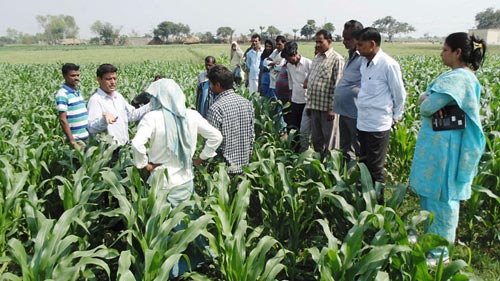By Meenakshi Singh, Raj Kumar Jat and Raj Gupta/CIMMYT
A recent field day in Bihar, India, showed farmers have confidence in conservation agriculture and don’t need agri-input subsidies but rather easy access to quality inputs and fair compensation for their produce.
During a field day on 12 March, about 100 farmers shared their experiences regarding zero tillage and its benefits and travelled through seven villages to see the performance of zero-till crops. The non-governmental organization (NGO) GUVVS is developing alternate options for rural improvement and has been working in several areas of Uttar Pradesh, Bihar and West Bengal since 2011. India’s Eastern Gangetic Plains are characterized by fragmented land holdings and resource-poor farmers who consistently face drought or floods. These conditions and the suboptimal crop management practices make agriculture risky.
Farmers in Bhagalpur, a district in Bihar near the Ganges River, face a variety of challenges. Low areas flood during the rainy season while rice in the uplands and midlands suffer from a lack of surface and ground water. Winter crops are sown late, resulting in low productivity. Excess soil moisture during winter crop seeding, terminal heat stresses in late-planting wheat, weeds and low-quality seed are some of the main issues hindering agriculture in the region.

With maize and wheat seed and other support from CIMMYT, Meenakshi Singh, GUVVS coordinator, has introduced new rice, wheat and pigeon pea cultivars with heat tolerance, water-logging tolerance and other adaptations. GUVVS also introduced resourceconserving zero till technology and new seeds through the seed production chain. Seed is provided to farmers in seven villages. Farmers get 20 to 30 kilograms of free seed from the NGO. They then repay the same amount of seed at harvest and sell what remains to fellow farmers. The NGO redistributes the collected seed to other farmers. GUVVS also provides new certified planting material for fruit tree crops at one-third of the cost for use by resource-poor farmers.
During the field day, farmer Bhola Yadav said zero-till technology has taken root in his village and is being practiced on more than 1,000 acres. The farmer-to-farmer distribution of quality seed has reached 500 farmers in the seven villages of Bhagalpur. Along with new seeds, they are promoting zero till for rice, wheat, maize, pigeon pea, pearl millet, chickpea and lentils. Zero tillage helped them in the early planting of the crops.
Raj Gupta, team leader for the Borlaug Institute for South Asia (BISA) Research Station Development, praised the farmers’ efforts and answered questions about conservation agriculture. Raj Kumar Jat, BISA cropping systems agronomist, responded to questions related to weed management and fertilizer use.
 Climate adaptation and mitigation
Climate adaptation and mitigation 
